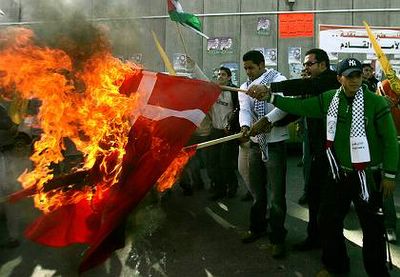For a second it looks like Sinatra is in love with Jobim. It's irony vs. sincerity, and I'm pretty sure Sinatra comes out looking like an asshole.
Saturday, May 20, 2006
Monday, May 15, 2006
Isaiah Berlin Version
The Fox is the poor man's Hedgehog.


I mention this only because I just decided I was a fox. Oh well, what are you gonna do?


I mention this only because I just decided I was a fox. Oh well, what are you gonna do?
Japxploitation
Delinquint Girl Boss: Worthless to Confess is pretty much a must see for anyone reading this. It has everything you need from a movie.
Naked girls with kick-ass tattoos:

Very strange insults:

Random lesbianism:

Ramen:

Crazy butterfly go-go dancers:

Then the Yakuza show up (of course) and start making ridiculous demands:

What!? Sever ties with Midori? That's the last straw. Time for an all-out sword fight, girls against boys.

But even in the middle of the fight, there's still time for more lesbianism:

The girls win, of course, but then they all get shipped off to prison (for more girl-on-girl, no doubt.)
They really don't make 'em like they used to.
Naked girls with kick-ass tattoos:

Very strange insults:

Random lesbianism:

Ramen:

Crazy butterfly go-go dancers:

Then the Yakuza show up (of course) and start making ridiculous demands:

What!? Sever ties with Midori? That's the last straw. Time for an all-out sword fight, girls against boys.

But even in the middle of the fight, there's still time for more lesbianism:

The girls win, of course, but then they all get shipped off to prison (for more girl-on-girl, no doubt.)
They really don't make 'em like they used to.
Tuesday, April 25, 2006
Friday, April 07, 2006
Lost
So Dougie R. doesn't like where Lost is going. I've got news for you: Lost isn't going anywhere. It will not make sense in the end. It will never get wrapped up. It's not an interesting show because there is some big mystery that we think we'll get to the bottom of, it's an interesting show because there are a bajillion theories, none of which make any sense at all.
Lost is the anti-reality show. Reality TV is wallpaper. It's background music. Artfully made but having no meaning in the real world. Lost as a TV show is sloppily made, and doesn't hold together, but the fun stuff happens on THIS side of the TV. All those fans on the internet.
Lost is the anti-reality show. Reality TV is wallpaper. It's background music. Artfully made but having no meaning in the real world. Lost as a TV show is sloppily made, and doesn't hold together, but the fun stuff happens on THIS side of the TV. All those fans on the internet.
Judas vs. Dan Brown
Background reading for the Judas story:
1. Elaine Pagels, The Gnostic Gospels. An examination of the other paths Christianity might have taken. The Judas Gospel is by all accounts Gnostic; Pagels of course didn't have access to it when she wrote this book, since it was sitting in a safety deposit box in New Jersey. But this is the context. (Gnosticism seems hot right now; Philip Pullman seems to be responsible.)
2. William Klassen, Judas: Betrayer or Friend of Jesus? Klassen points out that while paradidomi is usually translated as "betrayal," it really means something more neutral, like "handing over." Judas's bad reputation is thus based on a mistranslation.
3. Jorge Luis Borges, "Three Versions of Judas." Theologian Nils Runeberg shows that the savior of humanity was not Jesus but Judas. Classic Borges; also gnostic.
4. Andrew Lloyd Weber, Jesus Christ Superstar. As with Milton's Satan, Judas is the most interesting character.
This is the thinking man's Dan Brown. In the DaVinci Code, the idea is that Jesus was fully human to the extent that he had sex and his ancestors live to this day. This is exactly opposite the conceit in gnosticism, where the earth is something to escape, and where salvation is achieved through knowledge and the ideal. The former is focused on the material, the latter on the immaterial. In both cases, the church is assumed to be the betrayer of the real message of Christianity rather than its protector. And in both cases, the problem of interpretation is removed by focusing on the supposed existance of a secret code. All uncertainty about the meaning of the ultimate message is removed, because it can only be understood in one way. A terrible blasphemy: you really think the word of God means only one thing, instead of infinitely many?
1. Elaine Pagels, The Gnostic Gospels. An examination of the other paths Christianity might have taken. The Judas Gospel is by all accounts Gnostic; Pagels of course didn't have access to it when she wrote this book, since it was sitting in a safety deposit box in New Jersey. But this is the context. (Gnosticism seems hot right now; Philip Pullman seems to be responsible.)
2. William Klassen, Judas: Betrayer or Friend of Jesus? Klassen points out that while paradidomi is usually translated as "betrayal," it really means something more neutral, like "handing over." Judas's bad reputation is thus based on a mistranslation.
3. Jorge Luis Borges, "Three Versions of Judas." Theologian Nils Runeberg shows that the savior of humanity was not Jesus but Judas. Classic Borges; also gnostic.
4. Andrew Lloyd Weber, Jesus Christ Superstar. As with Milton's Satan, Judas is the most interesting character.
This is the thinking man's Dan Brown. In the DaVinci Code, the idea is that Jesus was fully human to the extent that he had sex and his ancestors live to this day. This is exactly opposite the conceit in gnosticism, where the earth is something to escape, and where salvation is achieved through knowledge and the ideal. The former is focused on the material, the latter on the immaterial. In both cases, the church is assumed to be the betrayer of the real message of Christianity rather than its protector. And in both cases, the problem of interpretation is removed by focusing on the supposed existance of a secret code. All uncertainty about the meaning of the ultimate message is removed, because it can only be understood in one way. A terrible blasphemy: you really think the word of God means only one thing, instead of infinitely many?
Friday, March 31, 2006
Quickly noted

Been real busy ignoring my work these last few weeks, so I haven't been able to pay enough attention to the Isreali Lobby piece (short version: yes most of the claims are a little exaggerated, but probably not enough to deserve such vitriol) or to whatever's going on in Paris.
Friday, March 17, 2006
Horn-rimmed, rose colored glasses
The blogosphere has been stepping to the wayback machine this week to play gotcha with quotes from the original Iraqi invasion, three years ago. (Hmm... guess which side turned out to be right?) My favorite is from David Brooks, 4 April 2003:
via Radosh
An Iraqi civilian in Najaf exulted, "Democracy! Whiskey! And Sexy!" giving the war its first great slogan.Also the first time I've agreed with David Brooks: that really is a great slogan.
via Radosh
Sunday, March 12, 2006
Human Rights Crisis?
Milosevic's death (or rather, his death prior to conviction) and the UN HRC problems (this article is vague, hopefully more will be out soon) are an interesting news pairing. Is there a crisis in human rights? I know very little about human rights theory, besides the fact that some in France (Benny-Levy? Furet? See, I know nothing) have criticized it as an inadequate basis for freedom and equality. The US also seems to be totally uninterested in supporting its enforcement, to the point where it doesn't really disturb a lot of Americans that we're breaking those rules. (To be fair, the BBC story doesn't say what the US objections are--maybe they want more sweeping reforms than others do?) This seems a fairly popular way to think about foreign policy from a non-realist perspective. Do we need another way? What are the alternatives?
One idea I'm toying with, and considering sharing with my students: Europe bases much of its postwar (or maybe post-cold war) self-image on being anti-genocide. Which is a fine thing to be, except that it has the annoying side effect of pissing off lots of Muslims, many of whom see their situation as comparable to what happened to Jewish Europe in 1940-45. I don't happen to agree with them, but to privilege genocidal oppression over versions of colonial and post-colonial oppression seems, shall we say, a little path dependent. Or to be less charitable: suspiciously convenient, from a European perspective.
The usual way this question gets raised is this: why does no-one rally to support Holocaust deniers like David Irving, but when it's a matter of anti-Muslim cartoons everyone jumps on board the free speech bandwagon? Andre Glucksmann says it's a matter of truth (the Holocaust was a fact) versus belief (Islam is merely a religion.) I think this is wrong: the idea of "the Holocaust" as a historical object is a construction that (if I'm right about Europe using it to ground its identity) is just as motivated by political and social reality as is the Muslim religion. I realize I need to be careful here: I don't doubt for a second that 6,000,000+ people died, nor that their deaths were willed by Nazi leaders, nor even that this was unprecedented and a crucial event in human history. I just question whether we can neatly separate that event as a genocide from the thousand other atrocities of the period or even now. Especially considering the Eastern European context, it's fair to say that there were other factors in play. It was genocide, but it wasn't JUST a genocide, and to pretend that's all it was is to let ourselves off to easily. "Never again" has become a sick joke at this point--let's be honest with ourselves.
I would prefer a lower bar for going after human rights abuses--Milosevic's trial would have been faster had people been less concerned with convincing everyone he was the reincarnation of Hitler and more concerned with pinning him with every one of his individual crimes. That would make the reconciliation process easier, probably. Tough in the case of Milosevic, who was less directly involved than Karadic and Mladic. I'll hold off dancing on Milosevic's grave and pray instead that they get those two.
One idea I'm toying with, and considering sharing with my students: Europe bases much of its postwar (or maybe post-cold war) self-image on being anti-genocide. Which is a fine thing to be, except that it has the annoying side effect of pissing off lots of Muslims, many of whom see their situation as comparable to what happened to Jewish Europe in 1940-45. I don't happen to agree with them, but to privilege genocidal oppression over versions of colonial and post-colonial oppression seems, shall we say, a little path dependent. Or to be less charitable: suspiciously convenient, from a European perspective.
The usual way this question gets raised is this: why does no-one rally to support Holocaust deniers like David Irving, but when it's a matter of anti-Muslim cartoons everyone jumps on board the free speech bandwagon? Andre Glucksmann says it's a matter of truth (the Holocaust was a fact) versus belief (Islam is merely a religion.) I think this is wrong: the idea of "the Holocaust" as a historical object is a construction that (if I'm right about Europe using it to ground its identity) is just as motivated by political and social reality as is the Muslim religion. I realize I need to be careful here: I don't doubt for a second that 6,000,000+ people died, nor that their deaths were willed by Nazi leaders, nor even that this was unprecedented and a crucial event in human history. I just question whether we can neatly separate that event as a genocide from the thousand other atrocities of the period or even now. Especially considering the Eastern European context, it's fair to say that there were other factors in play. It was genocide, but it wasn't JUST a genocide, and to pretend that's all it was is to let ourselves off to easily. "Never again" has become a sick joke at this point--let's be honest with ourselves.
I would prefer a lower bar for going after human rights abuses--Milosevic's trial would have been faster had people been less concerned with convincing everyone he was the reincarnation of Hitler and more concerned with pinning him with every one of his individual crimes. That would make the reconciliation process easier, probably. Tough in the case of Milosevic, who was less directly involved than Karadic and Mladic. I'll hold off dancing on Milosevic's grave and pray instead that they get those two.
Friday, March 10, 2006
Dammit!
Zizek has this theory (or buy it here) that the West wanted 9/11, that it was the fulfilment of an unconscious desire for the destruction of "the capitalist utilitarian de-spiritualized universe." We all wanted to wake up from the Matrix, basically. I had one of those "where were you" conversations about 9/11 a couple days ago--those few days right after there were awful, obviously, but I think they gave everyone the feeling that they were living in the real world for at least a little bit, and five years on that can make us a little nostalgic.
I say this because I'm trying to figure out what makes 24 a good show. One reason is that it brings up cultural issues in such a subtle way that you're not quite sure which side the show is on. For every bitchy mannish female boss, there's a douchebag President resorting to prayer as the last option in a hopeless situation. It should be shocking that a show about terrorism has not generated a single major protest in five years. I don't think this has anything to do with the quality of the show. It's just that no one can pin it down.
But what's the attraction of the show? It moves too fast to achieve anything more than superficial character development. And it sure as hell isn't a thoughtful examination of how one goes about stopping a terrorist plot. So it's basically counter-terrorism porn. But as with all porn, the viewer is not really sure which side they're on. Case in point: the most recent episode, in which (spoiler, but it was days ago, so get over it) CTU is the victim of a nerve gas attack. As with 9/11, the viewer is secretly rooting for the terrorists to succeed, as long as we (meaning the main characters) survive. How many faceless drones died without us giving a shit, before Edgar waddles in and supposedly makes us feel sympathy? The important part is not that we care that he's dead, but that Chloe now has an excuse to pull out her m-16. So the show is wish fulfilment in a different way: we WANT terrorist attacks mostly because it gives us justification for the fucked up things our government is doing.
Me, I'm still waiting for Jack to torture somebody who turns out to legitimately not know anything. Funny how he always turns out to be right, huh?
I say this because I'm trying to figure out what makes 24 a good show. One reason is that it brings up cultural issues in such a subtle way that you're not quite sure which side the show is on. For every bitchy mannish female boss, there's a douchebag President resorting to prayer as the last option in a hopeless situation. It should be shocking that a show about terrorism has not generated a single major protest in five years. I don't think this has anything to do with the quality of the show. It's just that no one can pin it down.
But what's the attraction of the show? It moves too fast to achieve anything more than superficial character development. And it sure as hell isn't a thoughtful examination of how one goes about stopping a terrorist plot. So it's basically counter-terrorism porn. But as with all porn, the viewer is not really sure which side they're on. Case in point: the most recent episode, in which (spoiler, but it was days ago, so get over it) CTU is the victim of a nerve gas attack. As with 9/11, the viewer is secretly rooting for the terrorists to succeed, as long as we (meaning the main characters) survive. How many faceless drones died without us giving a shit, before Edgar waddles in and supposedly makes us feel sympathy? The important part is not that we care that he's dead, but that Chloe now has an excuse to pull out her m-16. So the show is wish fulfilment in a different way: we WANT terrorist attacks mostly because it gives us justification for the fucked up things our government is doing.
Me, I'm still waiting for Jack to torture somebody who turns out to legitimately not know anything. Funny how he always turns out to be right, huh?
Vive la bourgeoisie!
Vive la bourgeoisie! Défense d'uriner
Originally uploaded by cicilief.
Real life is becoming indistinguishable from the movies. The sound film, far surpassing the theater of illusion, leaves no room for imagination or reflection on the part of the audience.
T.W. Adorno
Sunday, March 05, 2006
Friday, February 24, 2006
Civl war?
Very recent developments in Iraq are very bad, but there is probably a glimmer of hope in what news I've seen: the fact that Iraqis are stunned at the violence of the last few days probably means we won't see this continuously. There may be further outbreaks of this sort or worse, but hopefully they'll be infrequent.
I think now is the time to ask a tough question: at what point should we say Iraq has crossed the line from "sectarian violence" into "civil war"? What are the criteria that separate the two? On first reflection, a civil war seems to require (at least) two sides with competing claims to legitimate rule over a certain territory, but this seems unlikely in a time and place where the nation state looks very different than it did in (for example) 19th C America. Neither terrorist organizations nor fundamentalist Islamists--and I'm told there's an overlap there--seem to be interested in collecting taxes or providing police service. So let's come up with a broader definition of civil war, in order to fully reflect the violence of the situation if and when the time comes.
I propose this: we can call it a civil war when bombings and disruptions such as this are not resolved in any way before the next one occurs, so that the events run together enough to be considered one large event. To be more precise, this will occur when the period between major violent events is shorter than the news cycle. There will be at least two objections to this definition. First, that the length of a news cycle is undefined. I agree, but I don't mind leaving this as a subjective definition, open to reasonable interpretations. As a rule of thumb, let's remember that the Cheney shotgun story, which was drawn out longer than necessary because of a sloppy media strategy, lasted a little under a week. The second objection will be that this defines the term on the basis of our Western perception of events rather than that of the Iraqis, who would obviously be most affected by this hypothetical war. I don't really have a problem with this. The closer you get to the ground, the less it matters what you call it. If you die as a result of sectarian violence, you're just as dead as if you die in a civil war, and your family is just as devestated. It's only as you move away from the events that names become important. If we have a good idea what Civil War is, we'll have a better idea when to admit failure and change strategies.
That is, if anyone can think up something good.
I think now is the time to ask a tough question: at what point should we say Iraq has crossed the line from "sectarian violence" into "civil war"? What are the criteria that separate the two? On first reflection, a civil war seems to require (at least) two sides with competing claims to legitimate rule over a certain territory, but this seems unlikely in a time and place where the nation state looks very different than it did in (for example) 19th C America. Neither terrorist organizations nor fundamentalist Islamists--and I'm told there's an overlap there--seem to be interested in collecting taxes or providing police service. So let's come up with a broader definition of civil war, in order to fully reflect the violence of the situation if and when the time comes.
I propose this: we can call it a civil war when bombings and disruptions such as this are not resolved in any way before the next one occurs, so that the events run together enough to be considered one large event. To be more precise, this will occur when the period between major violent events is shorter than the news cycle. There will be at least two objections to this definition. First, that the length of a news cycle is undefined. I agree, but I don't mind leaving this as a subjective definition, open to reasonable interpretations. As a rule of thumb, let's remember that the Cheney shotgun story, which was drawn out longer than necessary because of a sloppy media strategy, lasted a little under a week. The second objection will be that this defines the term on the basis of our Western perception of events rather than that of the Iraqis, who would obviously be most affected by this hypothetical war. I don't really have a problem with this. The closer you get to the ground, the less it matters what you call it. If you die as a result of sectarian violence, you're just as dead as if you die in a civil war, and your family is just as devestated. It's only as you move away from the events that names become important. If we have a good idea what Civil War is, we'll have a better idea when to admit failure and change strategies.
That is, if anyone can think up something good.
Friday, February 10, 2006
Enough of that

One of my biggest disappointments was being to big to fit into Japanese clothing. My mother used to have a sweatshirt featuring the great Larry Biod, and I got nothing. Well, now my prayers are answered.
Thursday, February 09, 2006
What do you expect from a Yankees fan?

Muslim-baiting vs. violent fundamentalism? A pox on both your houses. Free speech is an important value, but sometimes silence is more honest. It's very hard to say anything in this matter without taking sides, and I don't want to do that.
But I'll say one thing: U.S. newspapers should run the cartoons now. They're legitimate news items. Not running them shows a lack of respect for the people of the Islamic world, since it assumes they can't tell news from racist provocation.
Click on the picture for smart commentary from Der Spiegel.
Friday, January 27, 2006
New Acquisitions
I was just going to pay rent and deposit my stipend check, but the used book stores sucked me in. It's an addiction, I swear.
Richard Farina, Been Down So Long It Looks Like Up To Me. So far I haven't gotten past Pynchon's intro; their Cornell seems to be a very different place than mine was.
Isaiah Berlin, The Crooked Timber of Humanity.
Janet Flanner, Paris Journal, 1944-1965. I love Paris Was Yesterday. This one's out of my period, but I'm sure it will be just as much fun.
Kobo Abe, The Woman in the Dunes. I'm told it's weirder than Murakami. I'm not a huge fan of Murakami, but weird is good.
Montaigne, Essays. It wasn't until I left the shop that I remembered I was planning on buying these in French.
Richard Farina, Been Down So Long It Looks Like Up To Me. So far I haven't gotten past Pynchon's intro; their Cornell seems to be a very different place than mine was.
Isaiah Berlin, The Crooked Timber of Humanity.
Janet Flanner, Paris Journal, 1944-1965. I love Paris Was Yesterday. This one's out of my period, but I'm sure it will be just as much fun.
Kobo Abe, The Woman in the Dunes. I'm told it's weirder than Murakami. I'm not a huge fan of Murakami, but weird is good.
Montaigne, Essays. It wasn't until I left the shop that I remembered I was planning on buying these in French.
Wednesday, January 25, 2006
Subscribe to:
Posts (Atom)

